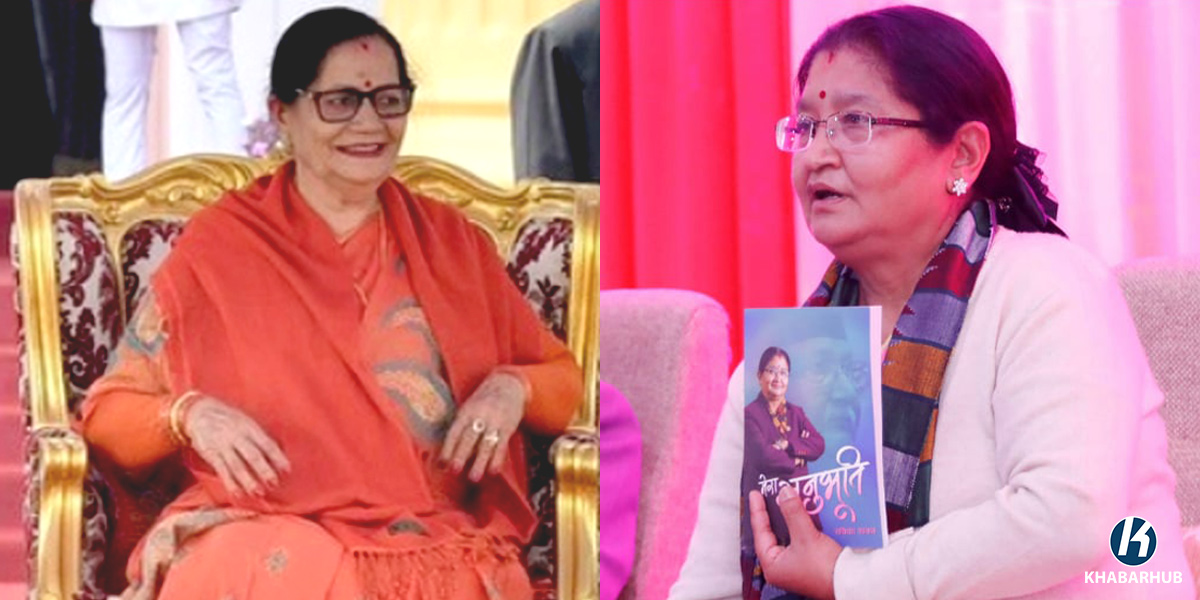KATHMANDU: At the launch ceremony of the book ‘Karuna’ by Radhika Shakya, wife of Prime Minister KP Oli, there was more discussion about her as the ‘First Lady’ than as the author.
The event also marked the 37th wedding anniversary of Oli and Shakya, with many prominent figures from various fields in attendance.
The event banner also referred to Radhika as the ‘First Lady’, a title that has been used by government, private, and mainstream media outlets when reporting on her.
This has led to the question on social media: ‘Who is the First Lady? The President’s wife or the Prime Minister’s wife?’
Social media users have strongly criticized the issue, with some accusing individuals of misusing the title for personal gain.
This has sparked a debate over who is the rightful holder of the ‘First Lady’ title. Internationally, the wife of the President is traditionally given this title, though not all countries consider the President to be the executive head.
In powerful nations like the U.S., China, and Russia, the President holds executive power.
In Nepal and India, the Prime Minister holds the executive role while the President is in a constitutional position.
According to the Nepal Gazette, the order of precedence places the President first, followed by the Vice President, and then the Prime Minister.
Thus, it would seem that the wife of the President should be referred to as the ‘First Lady’ based on this ranking.
President’s Wife: “The Great First Lady” – Constitutional expert
Constitutional scholar Bhimarjun Acharya argues that if the wife of the Prime Minister is called the First Lady, then the wife of the President should be called the ‘Great First Lady’.
Acharya explains to Khabarhub, “The President is the head of state, while the Prime Minister is the head of government. Since the President is the first citizen, their wife should be called the First Lady as a matter of respect.”
According to Acharya, the President’s wife should be referred to as the ‘First Woman,’ the Vice President’s wife as the ‘Second Woman,’ and the Prime Minister’s wife as the ‘Third Woman,’ in line with the constitutional ranking.
He emphasizes that calling the Prime Minister’s wife the ‘First Lady’ is not in line with tradition or protocol in Nepal, where the President holds the highest status as the head of state.
Acharya criticizes the recent trend of referring to the wives of Prime Ministers, ministers, and Chief Ministers as the ‘First Woman,’ calling it an absurd and misguided act that undermines the values of democracy, the rule of law, and constitutionalism.
He argues that while the Prime Minister’s wife is deserving of respect, the title of ‘First Lady’ should be reserved for the wife of the President.
A former law secretary, who wished to remain anonymous, also commented that there is no objection to the Prime Minister’s wife receiving significant attention, but noted that in countries like the U.S. and the U.K., the term ‘First Lady’ specifically refers to the President’s wife in America and the Prime Minister’s wife in Britain.
Constitutional Provisions for the Appointment of the President
Article 61 of the Constitution designates the President as the Head of State, also referred to as the ‘President of the Nation.’
Furthermore, Article 61, Clause 4, outlines the primary responsibility of the President to uphold and protect the Constitution.
Nepal follows a parliamentary system of government, meaning the President holds a ceremonial position independent of the executive and legislative branches.
Constitutional Provisions for the Appointment of the Prime Minister
Article 76 of the Constitution governs the appointment of the Prime Minister.
Clause 1 stipulates that the President appoint the leader of the majority party in the House of Representatives as Prime Minister.
However, in the absence of a clear majority party, Clause 2 applies, allowing the President to appoint a member of the House of Representatives who can secure a majority by gaining the support of two or more parties.









Comment